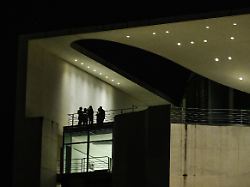Merz praises “good atmosphere”
Scholz invites people to the Chancellery for a migration pact
October 14, 2023, 3:23 a.m
Listen to article
This audio version was artificially generated. More info | Send feedback
So far there has been a huge disagreement between the federal and state governments when it comes to refugee policy. After the electoral successes of the right in the recent state elections, the Chancellor sees a need for action and invites people to the top meeting. In search of a common line, CDU leader Merz is also at the table.
The federal and state governments want to come to common solutions by the beginning of November to limit the influx of refugees into Germany. Chancellor Olaf Scholz and the chairmen of the Prime Minister’s Conference, Hesse’s Boris Rhein from the CDU and Lower Saxony’s Stephan Weil from the SPD, together with CDU leader Friedrich Merz as opposition leader in the Bundestag explored the possibilities for agreement for the first time in the evening. All sides then called the two-hour deliberations constructive – even if there were no concrete results.
Federal, state and opposition “on a common path” “I think it is now important that there is speed in solving the questions,” said Rhein as the new chairman of the Prime Minister’s Conference. He is in favor of a “all-in-one” migration package. The Chancellery said they agreed “that democrats must stick together and defend democracy.” The federal, state and opposition governments have “set out on a common path”. Merz praised the “good atmosphere” of the conversation in the ZDF “heute journal”: “We agree on the goal, and the next few days and weeks will show whether we agree on the path.”
Scholz had invited people to the meeting after the state elections in Hesse and Bavaria. All of the traffic light parties had suffered some dramatic losses, while the AfD won significantly and came third in Bavaria and even second in Hesse. The shift to the right was already apparent in the debate about the heating law, but was recently attributed primarily to dissatisfaction with migration policy.
All that remains of the “Germany Pact” is the issue of migration
Between the beginning of January and the end of September, 233,744 people in Germany applied for asylum for the first time, around 73 percent more than in the same period last year. Shortly before the elections, Scholz said for the first time that, in his opinion, too many refugees were coming to Germany. Even before that, he had offered the states and the “democratic opposition” a “Germany Pact” to advance reforms in Germany. By this he not only meant curbing irregular migration, but also other issues such as reducing bureaucracy.
The conversation with Merz and the Prime Minister now focused entirely on migration. In addition to Scholz, Rhein, Weil and Merz, Chancellor Wolfgang Schmidt was also at the dinner in the Chancellor’s apartment on the eighth floor of the government headquarters. “First of all, we got along well this evening,” Weil then described the atmosphere. “And I think we are so close to each other on this matter that something can come of it.”
All sides agreed that the meeting can only be a first step on the way to a meeting between the Chancellor and all Prime Ministers in Berlin on November 6th. Then there should be an oath. The most difficult question then needs to be clarified: financing the admission of refugees, for which the states are demanding additional billions from the federal government. But other questions should also be clarified by then. On November 6th “things will be finalized… including finances,” said Rhein.
The states and the Union present demands
The federal, state and Union governments have now put their cards on the table for further discussions. Federal Interior Minister Nancy Faeser from the SPD had already presented the basic principles of a bill on Wednesday that aims to reduce the number of deportations that fail at the last moment. In addition, the immigration authorities should be relieved by extended deadlines.
Immediately before the round in the Chancellery, the states agreed on a list of demands aimed at the federal government. In it, they demand that effective measures be taken to speed up the asylum process, that unauthorized entries be prevented, for example through stationary border controls at the borders with the Czech Republic and Poland, and that the conditions be created for the introduction of a nationwide uniform payment card for asylum seekers. “The measures taken so far are not yet sufficient to limit irregular migration,” it says in the joint resolution.
After the round in the Chancellery, the Union also presented a list of demands with 26 points. In it, Scholz demands, among other things, a “common understanding” that “Germany can tolerate asylum immigration of up to a maximum of 200,000 people per year with a view to the integration infrastructure and social cohesion.” Against this background, there must be a government statement from the Chancellor with the signal: “Germany’s absorption capacities have been exhausted.”
